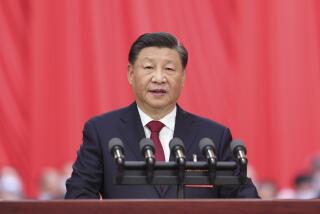China May Soon Raise Value of Its Currency
SHANGHAI — A revaluation of China’s currency, a step called for by the Bush administration and many U.S. trade groups, appears to be imminent, analysts said this week.
Speculation that a move may be coming soon, perhaps as early as this weekend, was heightened Friday when the Chinese yuan floated briefly above its official trading range. The Chinese currency is pegged to the dollar at 8.2765 yuan per $1 and rarely trades outside a narrow band.
Although dealers generally attributed the float to a technical glitch or error, it triggered a sharp reaction in global currency markets -- the dollar fell and gold rose -- and fueled talk that the Chinese may have been testing the waters.
“The odds are as high as they have ever been,” said Tim Condon, chief Asia economist for ING Financial Markets in Singapore.
He Fan, assistant director of the Institute of World Economics and Politics, a government think tank in Beijing, predicted that China would make a move within the next two months. In many ways, he said, conditions are ripe for China to do so. Its economy is strong, with low inflation, robust domestic demand and solid fiscal revenue growth.
The head of China’s central bank said last weekend that foreign pressure could hasten Beijing’s plans to revalue. The World Bank issued a report this week urging the Chinese to let the currency appreciate, citing risks similar to the speculative conditions that led to the Asian financial crisis.
“Such a move is increasingly necessary to avoid a global financial crisis, and perhaps even an economic crisis, depending on how global policymakers respond,” said Mark Zandi, chief economist of Economy.com.
American politicians and manufacturing groups have increasingly blamed China’s currency policy for contributing to the record U.S. trade deficit with China. Some economists say the yuan may be undervalued by as much as 40%. A cheap currency makes Chinese exports less expensive in foreign markets.
Experts said they expected Beijing to initially loosen, but not eliminate, the yuan-dollar peg. That step, they say, will boost the yuan’s value by less than 5% -- an amount that’s unlikely to have a big effect on China or other countries.
But an eventual move to a free-floating currency could have significant repercussions, economists said.
With its huge trade surplus with the United States, China has accumulated dollar reserves and has been using them to buy massive amounts of U.S. Treasury securities. That has supported the dollar and helped keep interest rates in the United States low, sustaining the American housing market and consumer spending. A shift in China’s policy could stem such activity, dispensing a bitter but necessary medicine for the U.S. economy, economists say.
For China, a revaluation could reduce emphasis on its export-intensive manufacturing sector, give Beijing greater control over its economy and spur growth in its services sector -- steps seen as important to helping improve China’s long-term development.
But some analysts warn that a premature revaluation could result in a hard fall for China’s economy as speculative money fueling its real estate market pulls out.
Recently, the U.S. and the European Union have heightened calls for China to act, as the Asian nation’s export-driven economy has continued to boom while the U.S. economy has slowed and Europe and Japan are mired in sluggish growth.
Although Beijing is loath to act under international pressure, in part because it will be seen at home as a loss of face, there may be an increasing recognition that the complaints may only grow louder.
“What if the external pressure will not stop and it gets even higher?” said He of the Institute of World Economics and Politics. “They don’t want to wait too long.”
More to Read
Sign up for Essential California
The most important California stories and recommendations in your inbox every morning.
You may occasionally receive promotional content from the Los Angeles Times.










